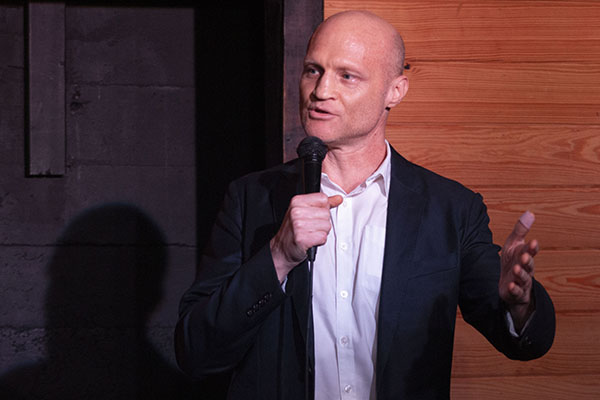Scott Dikkers grew up trying to humor his unamused peers. Seeing it as a way to connect with others, Dikkers eventually co-founded an international satirical newspaper, The Onion, before leaving in 2014.
On Thursday, the comedic entrepreneur performed at Fallout Theater in “Worded Funny,” a literary comedy show. Before his business of comedy workshop the following Saturday, Dikkers sat down with the Texan to talk comedy, fake news and why he left his own publication.
The Daily Texan: How did you get into the comedy writing game?
Scott Dikkers: As far back as I can remember, I was writing comedy, making cartoons and trying to make people laugh. I discovered at a very early age that it was a great way to get attention from family members and peers at school. It didn’t quite work with my peers at school at first, but it definitely worked with my grandma. Once you figure out a social connector like that, you roll with it. It probably took me 10 years before I was even barely adequate in terms of professional-caliber comedy, but I kept doing it because I loved it.
DT: Why did you leave The Onion in 2014?
SD: A billionaire bought most of the ownership. He was a nice guy, but it became a different thing. I can say with confidence that I will not be back. … (The paper) is much more of a strict news parody voice now. It took us a long time to zero in on that voice, but we used to experiment more. I like when they mix it up and try to do new things. They haven’t done that in a while. The brand is very consistent but … it has good years and bad years.
DT: The last time you were in Austin, you visited UT. What brought you to campus?
SD: I gave a talk at UT … about my history with The Onion. (I told) some funny stories about The Onion growing from a small college newspaper to a massive media conglomerate. I also met with the kids at the campus humor publication, the (Texas) Travesty … My main words of advice were, “Don’t do fake news.”
DT: How would you describe fake news?
SD: The first time I ever saw that phrase was when “The Daily Show” was marketing itself as a serious news show that was just jokes. They used the term “fake news” in a print ad, and it struck me. Why would you use that phrase? It’s funnier when you pretend it’s real. The Onion always pretends it’s real. Then, the whole idea of fake news ballooned to the point where I think of it now as propaganda on Facebook during an election. The meaning between satire, news parody and fake news has all gotten jumbled up. They’re all very distinct things in my mind, and fake news is the worst of them.
DT: How do you differentiate fake news from what The Onion publishes?
SD: The Onion does comedy. You’re not meant to be fooled, but if you are fooled, the joke’s on you. You’ll figure it out soon enough, and that’s all good fun. Fake news is when devious people are trying to trick others into believing things that aren’t true. Or, in the way Trump uses the phrase, it’s media that is obviously biased.





















